If you’re considering a South Africa trip, you’re about to embark on a journey filled with adventure, culture, wildlife, and breathtaking landscapes. From the vibrant city life of Cape Town to the serene wildlife safaris of Kruger National Park, South Africa offers a diverse and unforgettable experience for every traveler. But before you pack your bags and book your flights, there are some important tips to keep in mind to ensure you make the most of your trip. This guide will walk you through everything you need to know to plan your perfect South African getaway.
Table of Contents
Reasons to Add South Africa to Your Must-Visit List
South Africa is one of those destinations that captivates your heart the moment you step foot on its soil. The country’s rich history, diverse cultures, and spectacular natural beauty make it a must-visit. Whether you want to dive into the bustling streets of Johannesburg, soak in the panoramic views from Table Mountain, or witness the majestic “Big Five” during a safari, South Africa promises an experience like no other.
But the allure of South Africa doesn’t stop at its sights. The warmth of its people, the depth of its history, and the sense of adventure in its air will draw you in. There’s so much to explore in this vibrant country, and the only challenge is deciding where to begin.
In this comprehensive guide, we’ll cover the top tips for planning your South Africa trip, ensuring you get the most out of your experience. From choosing the right time to visit to planning your safari and budgeting wisely, we’ve got all the information you need to plan the ultimate trip to South Africa.

1. Research the Best Time to Visit South Africa
Understanding South Africa’s Seasons
South Africa’s seasons are quite different from those in the Northern Hemisphere, and the weather varies across the country’s diverse landscape. From the coastal warmth of Durban to the cooler temperatures of the highlands, the best time to visit depends largely on what activities you plan to do and where you’re heading. South Africa’s temperate climate means that you can visit at any time of the year, but understanding its seasonal nuances will help you plan an unforgettable trip.
Summer (November to March): During the summer months, temperatures in South Africa can range from warm to hot, depending on the region. Coastal areas, such as Cape Town and Durban, can be sunny and perfect for beach activities, with warm waters and plenty of sunshine. Summer is the prime time for outdoor activities like hiking, exploring vineyards, and visiting coastal regions. This is also a great time to visit the major cities, with festivals and events filling up the calendar. However, be mindful of the heat, especially if you’re traveling inland, as temperatures can be quite intense in places like Johannesburg and the Kruger National Park.
Additionally, summer is the best time for safaris in certain areas of South Africa, particularly those in regions like Kruger National Park. The weather is hot and dry, which makes the vegetation sparse, so wildlife is often easier to spot near waterholes.
Winter (May to September): Winter months bring cooler, more temperate weather. While coastal cities like Cape Town and Durban remain relatively mild, the inland areas can experience cold nights and pleasant, sunny days. This is the ideal time for wildlife viewing. The dry season means that animals gather around water sources, making them easier to spot, especially in Kruger National Park and other game reserves. Winter is also a great time for hiking and exploring areas like the Drakensberg Mountains, where crisp air and clear skies provide exceptional views.
While winter may not be as hot for outdoor adventures, it is generally considered the best time for safaris, with fewer tourists and optimal wildlife sightings. Plus, you’ll enjoy more comfortable travel in the cities, which tend to be less crowded compared to the busy summer months.
When to Visit for Your Desired Experience
Safari Experience: If you’re traveling primarily for the safari, you’ll want to visit during the dry winter months, ideally between May and September. The bush is thinner, and animals tend to gather around waterholes, providing the perfect opportunity for exceptional wildlife viewing. However, if you’re willing to brave the heat, the summer months offer the bonus of fewer tourists in national parks like Kruger.
City Life & Beaches: South Africa’s cities and beaches are great to visit year-round. Cape Town’s beaches are best enjoyed in the summer, when you can soak up the sun along its shores and enjoy the bustling energy of the V&A Waterfront. Durban, with its year-round warm weather, is ideal for beach lovers and those wanting to experience a more tropical vibe. Johannesburg, the largest city in South Africa, offers temperate weather throughout the year and is perfect for exploring the cultural, historical, and urban attractions.
By aligning your trip with the best time for your specific interests, you’ll maximize your enjoyment and ensure ideal weather conditions for your activities.
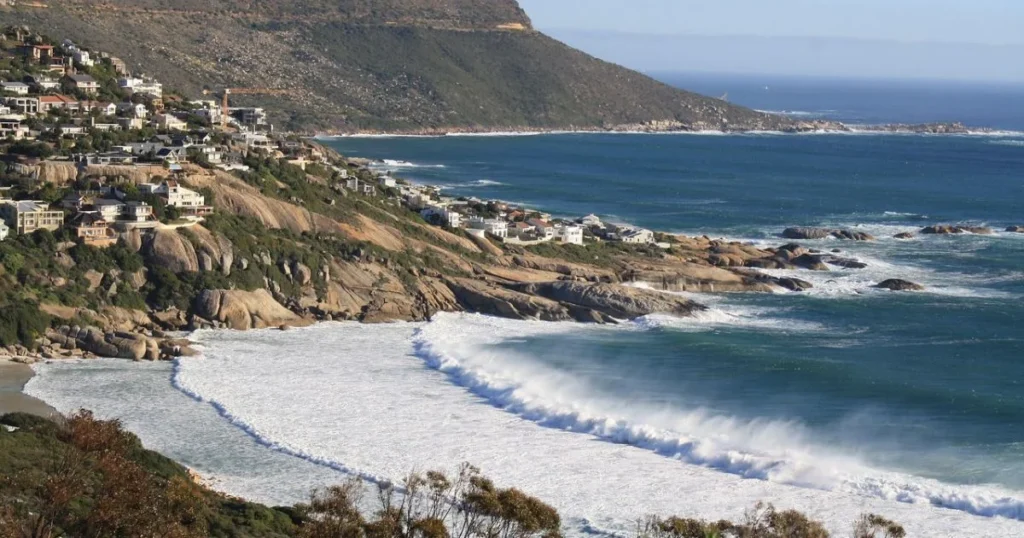
2. Choose Your Destinations Wisely
South Africa is known for its diverse landscape and attractions, catering to all kinds of travelers. Whether you’re after a thrilling safari, stunning natural scenery, or cultural experiences, there’s no shortage of places to explore. Here are a few top destinations you should add to your itinerary:
Cape Town: The Mother City
Cape Town is often referred to as the “Mother City” because of its rich history, stunning beauty, and vibrant culture. Set against the backdrop of the iconic Table Mountain, Cape Town offers a mix of outdoor adventures, cultural landmarks, and urban excitement. It’s a city that blends modern living with a deep history.
Must-See Attractions:
- Table Mountain: A trip to Cape Town wouldn’t be complete without taking the cable car or hiking up Table Mountain. The summit offers breathtaking views of the city, coastline, and the surrounding peninsula.
- V&A Waterfront: This lively area is home to shops, restaurants, and attractions, including the Two Oceans Aquarium and the Zeitz MOCAA Museum of Contemporary Art.
- Robben Island: A UNESCO World Heritage site, Robben Island is where Nelson Mandela was imprisoned for many years. Visiting the island offers a powerful experience and insight into South Africa’s apartheid history.
Cape Town also offers beautiful beaches, like Clifton Beach and Camps Bay, making it a perfect city for beach lovers who want to experience culture and nature all in one.
Kruger National Park: A Once-in-a-Lifetime Safari Adventure
As one of the largest and most famous game reserves in Africa, Kruger National Park should be high on your list if you’re interested in a safari. The park spans over 7,500 square miles and is home to an incredible diversity of wildlife, including the “Big Five” — lions, elephants, buffalo, rhinos, and leopards.
Safari Tips:
- Guided Safari vs. Self-Drive: Opt for a guided safari to gain expert insight into the wildlife and ecosystem of Kruger. If you prefer a more independent experience, a self-drive safari offers you flexibility to explore at your own pace, although it’s crucial to follow the rules for safety.
- Best Time to Visit: To maximize your safari experience, visit between May and September. The dry conditions mean animals are drawn to waterholes, making them easier to spot.
In addition to safaris, Kruger National Park is a haven for bird watchers, photographers, and nature lovers alike.
The Garden Route: A Coastal Adventure
The Garden Route is a scenic stretch of road running along the southern coast of South Africa, connecting cities like Cape Town to the Eastern Cape. This route offers a variety of landscapes, from beaches to forests, making it ideal for road trips and nature exploration.
Highlights of the Garden Route:
- Knysna: Known for its lagoon, Knysna is surrounded by lush forests and offers various outdoor activities like hiking, kayaking, and exploring the nearby Knysna Heads.
- Plettenberg Bay: This charming coastal town is perfect for whale watching during the right season, with an abundance of pristine beaches and wildlife.
The Garden Route is also home to Tsitsikamma National Park, where you can enjoy canopy tours, zip-lining, and beautiful forest hikes.
The Drakensberg Mountains: South Africa’s Natural Beauty
If you’re an adventure enthusiast, the Drakensberg Mountains will not disappoint. This spectacular range is filled with dramatic peaks, valleys, and waterfalls. It’s a prime destination for outdoor activities such as hiking, rock climbing, and exploring caves.
Hiking Trails: The Drakensberg offers numerous trails, from moderate hikes to challenging climbs. One of the most popular hikes is the Amphitheatre hike, which provides amazing views of the surrounding mountains and valleys.
You’ll also find ancient San rock art in caves and shelters in the area, making it a destination that blends natural beauty with cultural heritage.
The Eastern Cape: Wildlife and Wilderness
The Eastern Cape is a region known for its rugged coastlines, wildlife reserves, and rural beauty. This area is home to Addo Elephant Park, which has the densest elephant population in Africa, along with other animals like lions, zebras, and buffalo.
Safari Highlights:
- Addo Elephant Park: A must-visit for animal lovers, this park is home to over 600 elephants, and visitors can take guided safaris to see these majestic creatures up close.
- Wild Coast: For a more secluded experience, the Wild Coast offers unspoiled beaches, coastal forests, and charming villages.
The Eastern Cape is perfect for those who want a blend of nature, wildlife, and serene landscapes.
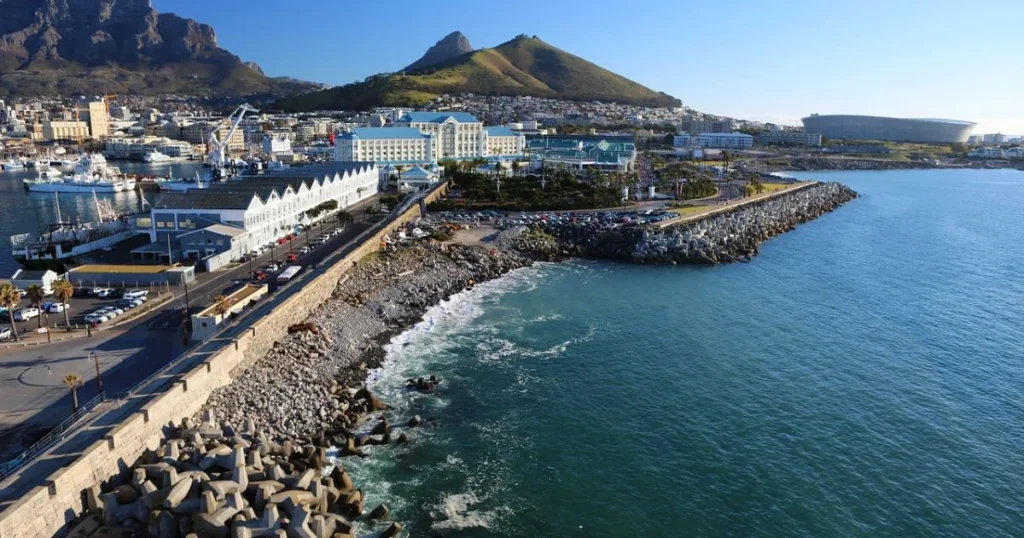
3. Budgeting for Your South Africa Trip
Budgeting is one of the most crucial aspects of planning your South Africa trip. Fortunately, South Africa is considered quite affordable compared to other international destinations, offering a range of options that can fit different budgets. However, the costs will vary depending on your travel style, the type of activities you want to do, and your accommodation preferences. Here’s a detailed look at what you can expect to spend during your South Africa trip, and how to manage your finances wisely.
Accommodation Costs
One of the largest portions of your budget will go toward accommodation. South Africa offers a variety of accommodations, from budget-friendly hostels to luxury safari lodges. Below is an overview of the accommodation options and their costs:
- Budget: If you’re traveling on a tight budget, you’ll find affordable options like hostels and guesthouses. These typically range from $15 to $40 per night, making them ideal for backpackers and those who don’t mind basic amenities.
- Mid-Range: For those seeking more comfort without splurging, mid-range hotels, lodges, and B&Bs are a great choice. You can expect to pay anywhere from $50 to $150 per night for a comfortable stay with additional amenities such as private rooms, breakfasts, and Wi-Fi.
- Luxury: If you’re looking for high-end accommodations, South Africa has plenty to offer. Luxury hotels and exclusive safari lodges can cost $200+ per night, offering top-tier services, scenic views, and luxurious experiences like private game drives, fine dining, and spa treatments.
While accommodation costs can vary, it’s important to remember that the price often reflects the location and the type of experience you’re seeking.
Food & Dining
South African cuisine is a vibrant mix that showcases the country’s rich cultural heritage. Whether you’re enjoying street food or indulging in fine dining, there’s something to satisfy every palate and budget.
- Street Food: If you’re looking for a quick, inexpensive meal, South Africa’s street food scene offers tasty options like bunny chow (a curry dish in a bread bowl) or boerewors (a local sausage). A typical meal from a street vendor will cost you around $3 to $5.
- Restaurants: Dining at mid-range restaurants is also quite affordable compared to many Western countries. Expect to pay between $10 to $25 per person for a full meal, depending on the restaurant and the region. Many establishments offer local delicacies, fresh seafood, and international dishes.
- Fine Dining: If you’re in the mood for something special, South Africa boasts several fine dining establishments, especially in cities like Cape Town. Here, meals can cost $30 to $60+ per person, depending on the restaurant.
You can easily experience a variety of meals at affordable prices in South Africa, so you don’t have to worry about spending too much on food unless you choose to dine at more upscale establishments.
Activities & Excursions
South Africa offers a wealth of activities and excursions that cater to all kinds of travelers, from wildlife safaris to cultural experiences. Here’s a breakdown of the costs associated with popular activities:
- Safari Costs: One of the highlights of a South Africa trip is going on a safari, and prices can vary depending on the type of experience you want. Guided safari tours typically range from $50 to $200 per day, with the price depending on the park, type of tour (luxury vs. budget), and the season. Luxury safari lodges or private game reserves can cost significantly more, but the experience is unrivaled.
- Tourist Attractions: Entrance fees to museums, national parks, and other attractions are typically affordable, with most fees ranging from $5 to $30 per person. Some iconic spots, such as Table Mountain or the Robben Island ferry, are a bit higher, but still very reasonable compared to similar attractions globally.
- Adventure Activities: South Africa is a haven for adventure enthusiasts. Whether you’re looking to go bungee jumping, hiking in the Drakensberg Mountains, or enjoying a hot-air balloon ride, expect to spend around $30 to $150 per activity depending on the experience.
While some activities, such as safaris, can be costly, there are many budget-friendly options available, making it easy to enjoy your trip regardless of your budget.
Money-Saving Tips
To make your South Africa trip even more affordable, here are a few money-saving tips to help you stick to your budget:
- Book in Advance: To secure the best rates, especially for popular activities like safaris, booking your accommodations and tours in advance is key. Many safari lodges and tours offer early bird discounts or deals for booking several months ahead.
- Travel During the Off-Season: If you’re flexible with your travel dates, consider visiting South Africa during the shoulder seasons (April-May and September-October). These months offer lower prices, fewer crowds, and generally pleasant weather, especially for safaris.
- Public Transport: In cities like Johannesburg, Cape Town, and Durban, public transport is an affordable option for getting around. Uber and local buses are also cost-effective, especially if you’re not planning to rent a car. Stick to these options for getting around urban areas to keep your transportation costs low.
- Choose Less Touristy Areas: While places like Cape Town and Kruger National Park are popular, they can be more expensive. Consider visiting lesser-known destinations that offer similar experiences at a lower cost, such as the Eastern Cape or the Free State.
By following these budgeting tips and considering your travel preferences, you can have an unforgettable South Africa trip without breaking the bank.
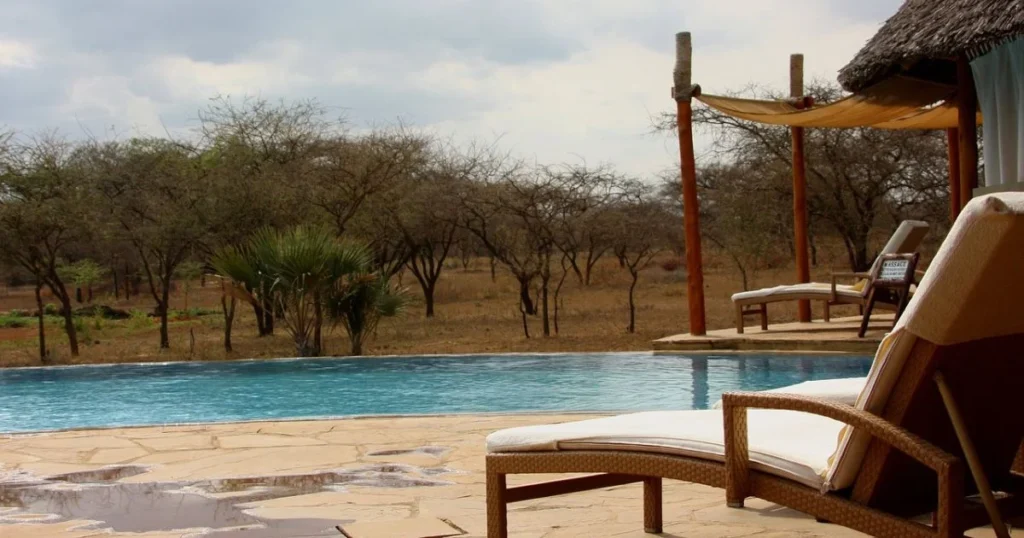
4. Booking Accommodation in South Africa
Accommodation in South Africa caters to all budgets, from affordable hostels to luxurious safari lodges, ensuring that every traveler can find a suitable place to stay. The key to booking the right accommodation is understanding your preferences and the purpose of your trip.
Types of Accommodations
South Africa offers a wide range of accommodation options, ensuring you find something that fits your travel style and budget. Here are some of the top choices available:
- Safari Lodges: If you’re coming for a safari, a stay at a safari lodge is a must for a truly immersive experience. These lodges are typically located in or near national parks and game reserves. Many offer guided game drives, luxury accommodations, private cabins, and exceptional service. Prices for safari lodges can range from $150 to $500+ per night, depending on the lodge’s exclusivity and the services offered.
- Guesthouses: For a more affordable and homely stay, guesthouses offer a welcoming atmosphere with personalized service. These are common in South Africa’s cities and rural areas and often include breakfast in the price. Expect to pay between $40 and $120 per night for guesthouse accommodations.
- Budget Options: If you’re on a tight budget, hostels or budget hotels are great options. These provide basic but comfortable accommodations for a fraction of the cost of mid-range hotels. Prices typically range from $15 to $40 per night, with many hostels offering shared dormitories or private rooms.
Considerations for Booking
When booking your accommodation, there are a few factors to keep in mind to ensure a smooth stay:
- Location: Location is crucial, especially if you plan to explore a specific area. In Cape Town, for example, staying near the V&A Waterfront provides easy access to shops, restaurants, and popular tourist attractions. For safaris, booking accommodation near national parks like Kruger can save you valuable travel time and help you maximize your safari experience.
- Reviews: Always check reviews on reputable platforms like TripAdvisor, Booking.com, or Airbnb before booking. This will help ensure that you’re choosing accommodation that matches your expectations and needs. Pay attention to feedback regarding cleanliness, service, location, and the quality of amenities.
- Inclusions: Some accommodations include extras like breakfast, free Wi-Fi, or airport transfers. Consider these perks when booking to get the best value for your money.
By planning your accommodation carefully and choosing the best option for your trip, you’ll ensure a comfortable and memorable stay during your South Africa adventure.
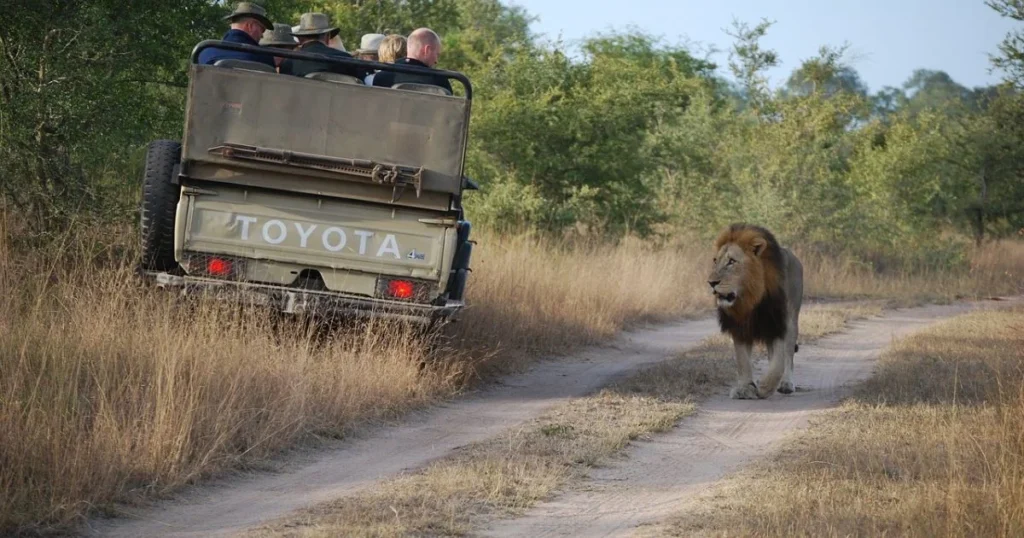
5. Plan Your Safari Experience
A safari is one of the most exciting and memorable aspects of any South Africa trip. Whether you’re a wildlife enthusiast or craving an unforgettable adventure, a safari provides a unique opportunity to immerse yourself in nature like never before. To fully enjoy this experience, careful planning is key. Here are some key considerations to help you prepare for your safari adventure:
Types of Safaris
South Africa offers several types of safari experiences, each with its unique charm and benefits. Understanding the different options will help you choose the one that aligns with your interests and travel style:
- Guided Safaris: Opting for a guided safari is the most popular choice for those who want an informative and enriching experience. A knowledgeable guide will drive you through the reserve, share fascinating insights about the wildlife, and help you spot animals you might miss on your own. This is the ideal choice for first-time safari-goers and those looking for an educational experience. Guides typically share information about animal behavior, local flora, and the ecosystem.
- Self-Drive Safaris: If you enjoy independence and the flexibility to explore at your own pace, a self-drive safari might be the perfect option for you. In parks like Kruger National Park, you can rent a car and navigate the park on your own. This type of safari allows you to explore remote areas and enjoy a more personalized experience, but it does require a good understanding of the park’s layout and safety precautions.
- Walking Safaris: For a more immersive and intimate experience, consider a walking safari. Led by experienced rangers, walking safaris take you deep into the wild on foot. This is a chance to get closer to the animals and understand the environment on a deeper level. It’s a more physically demanding experience, but one that many find incredibly rewarding. It’s especially ideal for those who want a truly unique way to experience the South African wilderness.
Safari Essentials
To ensure that you’re fully prepared for your safari adventure, there are a few essential items you should pack:
- Clothing: Light, neutral-colored clothing is recommended to blend in with the environment. Avoid bright colors and white, as they can attract attention and disturb the animals. Lightweight, long-sleeved shirts and pants will also protect you from the sun and insects.
- Sunscreen: South Africa enjoys a sunny climate, and you’ll likely spend a lot of time outdoors during your safari. Be sure to bring a high SPF sunscreen to protect your skin from harmful UV rays.
- Binoculars: While some animals can be seen from a distance, having a pair of binoculars will help you get a closer look at the wildlife. This is particularly useful for birdwatching and spotting animals in the tall grass or trees.
- Camera: A good camera is essential for capturing the incredible moments you’ll experience on your safari. A DSLR or mirrorless camera with a zoom lens is perfect for capturing wildlife. Be sure to bring extra memory cards and batteries to ensure you don’t miss any moments.
- Insect Repellent: In certain areas, like Kruger National Park, malaria is a risk, so it’s important to pack insect repellent. Even in malaria-free areas, the repellent will help keep mosquitoes and other insects at bay.
By packing these essentials, you’ll be well-equipped for a safe and enjoyable safari experience.
6. Health & Safety Tips for South Africa
South Africa is generally a safe destination for tourists, but like any country, there are a few health and safety considerations to keep in mind. By following these tips, you can enjoy a safe and healthy journey:
Vaccinations
Before your trip, it’s important to check with your healthcare provider about any necessary vaccinations. Some common vaccinations recommended for travelers to South Africa include:
- Hepatitis A and B: Both are transmitted through contaminated food or water and can be common in areas with lower sanitation standards.
- Typhoid: Like Hepatitis A, typhoid can be contracted through contaminated food or water, especially in rural areas.
- Malaria Pills: If you’re visiting areas like Kruger National Park, malaria is a risk. It’s advisable to consult your doctor about taking malaria prophylaxis before you go.
In addition to these vaccinations, make sure to stay up-to-date on routine vaccinations like tetanus, measles, and flu.
Safety
While South Africa is a popular tourist destination, it’s important to stay aware of your surroundings and take basic safety precautions:
- Stick to well-populated areas: This is particularly important in cities, where there may be more risk of petty crime. Always stay in well-lit, busy areas, especially at night.
- Avoid traveling alone at night: If possible, avoid walking around or driving alone after dark. Use reputable transportation services like Uber for city travel, as taxis can sometimes be unreliable.
- Reputable transportation: Always use trusted forms of transport. When hiring a taxi, choose one from an established company. In larger cities like Johannesburg and Cape Town, Uber is a safe and convenient option.
By following basic safety guidelines and being aware of your surroundings, you can enjoy a safe trip to South Africa.
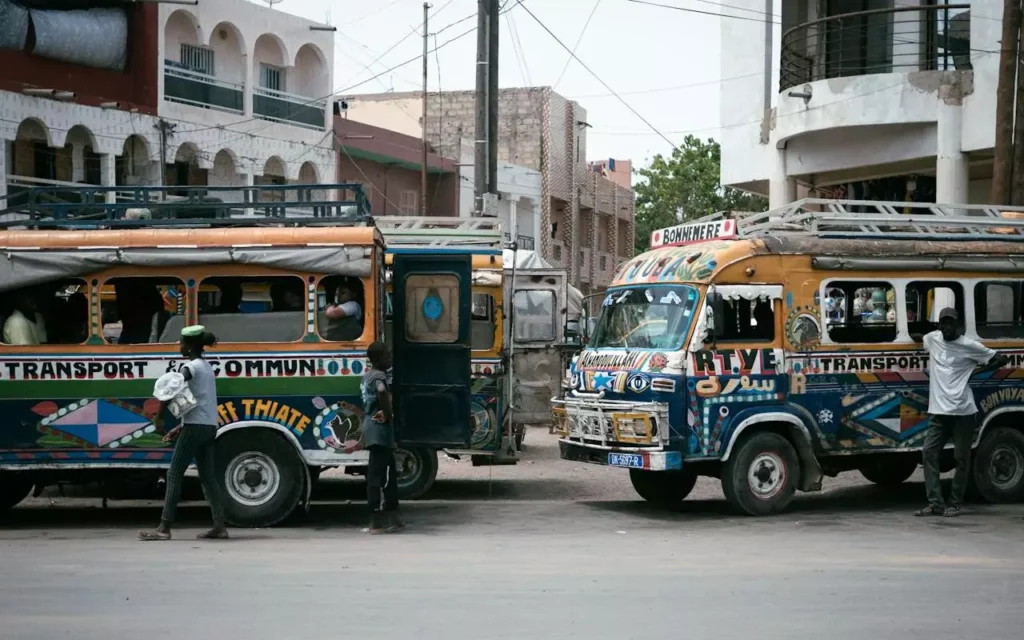
7. Transportation in South Africa
South Africa has a well-developed transportation system, and getting around the country is relatively easy. Here are the key transportation options available:
Domestic Flights
South Africa is a large country, and flying between major cities like Johannesburg, Cape Town, and Durban is one of the most efficient ways to get around. Domestic flights are affordable and convenient, with several airlines offering regular services. Flying between cities can save you time and allow you to maximize your vacation. Look out for deals and book in advance to get the best prices.
Car Rentals
Renting a car is one of the best ways to explore South Africa at your own pace. Whether you’re driving along the Garden Route or exploring the countryside, having your own vehicle offers flexibility and convenience. South Africa’s roads are generally well-maintained, and many popular tourist destinations are easily accessible by car. If you’re planning a self-drive safari, renting a 4×4 vehicle is recommended, especially for remote areas.
Public Transport
While public transport is available, it’s not always the most reliable. Buses and taxis operate in cities and towns, but the quality and safety of these services can vary. In urban areas, Uber is a highly reliable and affordable option for getting around. It’s safe, convenient, and available in major cities across the country.
8. Embrace South Africa’s Unique Culture & Wildlife
South Africa’s cultural and natural heritage are as diverse as its landscapes. To fully immerse yourself in the South African experience, take time to engage with the local culture and wildlife. Here are a few ways to achieve this:
Cultural Villages
Visit cultural villages to learn about traditional South African life. Many communities welcome tourists and offer a chance to experience indigenous cultures, music, dance, and crafts. These villages are often located in rural areas, providing insight into daily life away from the bustling cities.
Art and Craft Markets
South Africa is home to vibrant art and craft markets, where you can shop for unique handmade items such as jewelry, textiles, sculptures, and paintings. These markets are a great way to support local artisans and take home a piece of South Africa’s cultural heritage.
Respect for Traditions
When engaging with local cultures, always approach experiences with respect. Be mindful of local customs, especially when visiting sacred or important cultural sites. Ask for permission before taking photos and be respectful of the community’s space.
Conclusion: Making the Most of Your South Africa Trip
A South Africa trip is a once-in-a-lifetime experience, offering everything from thrilling safaris and breathtaking landscapes to vibrant cultural experiences. By following the tips in this guide, you’ll be well-equipped to plan a trip that suits your interests, budget, and schedule.
From choosing the best time to visit, planning a memorable safari, and embracing South Africa’s unique culture, there’s no shortage of adventures to be had. Remember to stay safe, respect local traditions, and, most importantly, enjoy every moment of your South African journey.
Now that you have the tools to plan your dream South Africa trip, it’s time to start booking your flights and packing your bags. Safe travels, and enjoy the incredible experiences that await you in South Africa!

